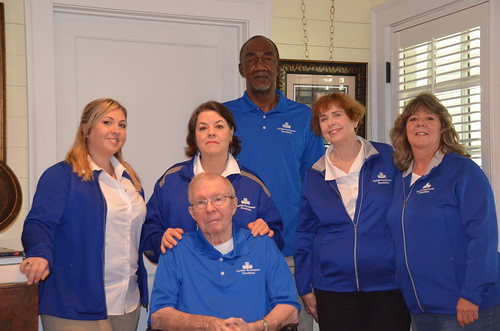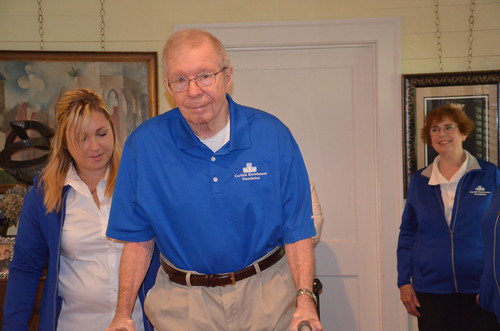Carlisle Foundation bridges gap between clinic and in-home rehab
Article body
Through a life of hard work, integrity and brilliant corporate leadership, Dwight Carlisle earned the respect of everyone around him.
He grew up in Alexander City and commuted to Auburn University to study textile engineering. He worked as a co-op student at Russell Corporation, the textile and clothing giant headquartered in his hometown. Upon graduation in 1958, he was hired full time at Russell where he rose through the management ranks, learning every job in every plant, until he became the company's president and CEO. The corporation thrived under his leadership.
After 33 years he retired from Russell and was named the state's revenue commissioner by then Gov. Bob Riley. A longtime benefactor of his beloved alma mater, Carlisle was named to the Auburn University Board of Trustees in 2004. In the midst of his deep involvement in numerous academic and cultural affairs at the university and within the Auburn community itself, Carlisle suffered his third stroke on Christmas Day, 2010. He could not speak or walk. He made some progress in physical therapy but continued to struggle with basic movement and balance. The doctors told his wife Helen they had done all they could do and sent him home.
"That's not who Dwight is," Helen Carlisle said. "He is a self-made man in every respect. He is a CEO. He likes to push, yes, but he also likes to be pushed. He wasn't going to take this lying down, literally or figuratively."
Now, six years later, Dwight Carlisle is vigorous, passionate and highly intelligent. He has regained much of his speech. He still retains an air of authority and, with great effort and concentration, he can exit his wheelchair and walk upright. As has been typical of Carlisle's vision and generosity, he wants to share this success with others.
To this end, he recently hosted the public launch of the Carlisle Enrichment Foundation, whose mission is to extend rehabilitation, fitness and exercise programs for people recovering in their homes from stroke, Parkinson's or other medical conditions. In essence, the foundation seeks to help others who, for insurance or financial reasons, must transition from physical or occupational therapy to in-home exercise and wellness programs.
"We are not competing with our local PT clinics," explained Jessica Hutzul, a graduate of the College of Education's School of Kinesiology at Auburn and the executive director of the Carlisle Enrichment Foundation. "We want to work in conjunction with these clinics to help with the transition. It's more like a bridge to wellness when a patient is discharged from his or her clinical rehabilitation setting. Insurance and Medicare typically pay for maybe nine to 12 weeks of therapy, with two visits per week. That's enough time to learn the exercises, but not to make lasting progress without continuing in a home exercise program. With this clear deficit out there, we want to step in and provide in-home exercise programs, prevent muscle atrophy and help stimulate the person's commitment to following through on their long-term exercise prescription. These physical engagements also help stave off depression and improve the quality of life. It also provides a break for the family or caregiver, and provides the patient with social and emotional support."
In a recent interview, Carlisle confirmed all of this, although he remains a man of few words.
"My best days are when Jessica comes to the house," he said. "It's what I look forward to the most."
The Foundation has already provided assistance to approximately two dozen individuals in the surrounding counties. Typically, people recovering from a stroke, head injury, spinal stress or the onset of Parkinson's have difficulty remaining exercise compliant. For physical and emotional reasons, they don't have the will to push forward or are unsure how to proceed. Others are compliant but just don't have the resources to continue. The Carlisle Enrichment Foundation works to counter these well-established trends.
Feelings of family
Hutzul met the Carlisles when Grant Davis, secretary to the Auburn University Board of Trustees, told School of Kinesiology Director Mary Rudisill about Dwight and his need for therapy. Transportation and getting in and out of a car was problematic, so Hutzul made a tentative visit to the Carlisle home. The foundation ultimately grew out of that moment.
"I began working with Mr. Carlisle while I was earning my master's, which was soon after his stroke," she said. "When I started, he couldn't sit up, open his right hand or get out of his chair. The day I left, in August of 2012, he walked across the room holding my hand. It was a very emotional moment, especially for Mrs. Carlisle. By that time, we were like family."
This closeness is what drew Hutzul back to Auburn. She worked as an athletic trainer for a year in Kansas, using the skills she developed at the School of Kinesiology's Warrior Athletic Training Center. During that year the Carlisles worked with kinesiology student Jillian Keeler. But following a re-hospitalization as a result of pneumonia, they also hired Ben Buchanan, an experienced caregiver who had worked for many years with the Russell family. He remains with the Carlisles and the foundation today, where he serves as an advisory board member.
"I met Mrs. Carlisle over the phone on April 15, 2013, and she invited me to come down to Auburn," he said. "She hired me that day. Mr. Carlisle's doctors had told her that he had hit a wall and that nothing more could be done. It's a blessing from God that she would not accept that. Mr. Carlisle has a strong personality, but she's strong, too. It helps that I'm not a family member, so he kind of has to go along with me when I'm there. But so much of rehabilitation is more mental than physical. I'm here all day, five days a week, and I keep pushing him. Jessica is what I call the brains behind the foundation. Like Mrs. Carlisle, Jessica was a gift from God. I could never imagine that he would have come so far so fast."
The foundation is presently serving eight separate people in Auburn, Alexander City, Seale and Lafayette. In the spring, the foundation will be taking on a practicum graduate student from the School of Kinesiology.
"We're now at the point where we have gone out and executed our three-year plan of proving the need is there, gaining experience in helping others and showing that our program makes an obvious difference," Helen said. "Some of the stories we could tell are just amazing, the way people and families have been transformed through the foundation's work. We're developing relationships with clinics and home health agencies, and we want to hire both clinical and administrative staff as we grow. But at this point we need financial support because what we do requires great resources. There are so few options out there for people, and the need is great. We see that every day here at home, a place where we are truly happy to be."
To learn more, visit www.carlisleenrichmentfoundation.org. You may also contact Hutzul at jhutzul@carlisleef.org, or call her at 910-502-2445.
Related Media
Related Links
Media interested in this story can contact Communications Director Preston Sparks at (334) 844-9999 or preston.sparks@auburn.edu.
Auburn University is a nationally ranked land grant institution recognized for its commitment to world-class scholarship, interdisciplinary research with an elite, top-tier Carnegie R1 classification, life-changing outreach with Carnegie’s Community Engagement designation and an undergraduate education experience second to none. Auburn is home to more than 30,000 students, and its faculty and research partners collaborate to develop and deliver meaningful scholarship, science and technology-based advancements that meet pressing regional, national and global needs. Auburn’s commitment to active student engagement, professional success and public/private partnership drives a growing reputation for outreach and extension that delivers broad economic, health and societal impact.






